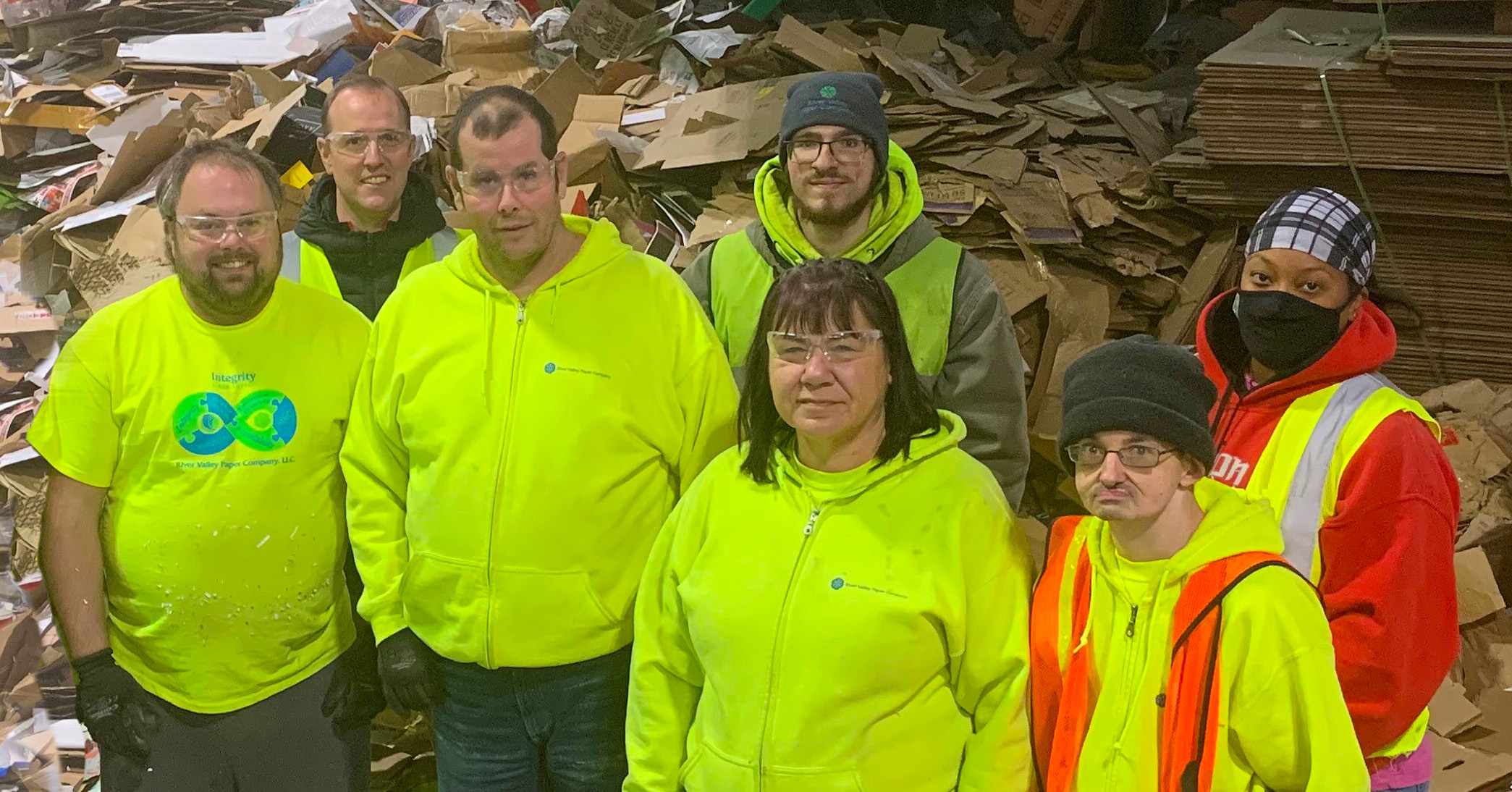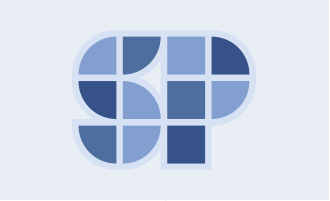Willing & able
Integrity Fiber Supply’s River Valley Paper Company facility in Akron, Ohio, has filled key positions on its line with capable workers with disabilities. Learn how this practice aligns with Integrity’s values — and get tips that may inspire you.
In July 2019, River Valley Paper Company had a problem. At the paper recycler’s processing facility in Akron, Ohio, several key positions had become difficult to fill.
“We had a high turnover on one of our lines where workers sort cardboard from paper and separate paper by grade,” said Bradd Kurtz, vice president of operations at Integrity Fiber Supply.
Scott Hardaway, River Valley’s human resources manager, had an idea for solving the problem. Scott, who has worked with disability service providers, proposed that River Valley contact Community Connections, a local agency that, among other things, helps people with disabilities find meaningful work at fair wages. He had a feeling that workers from Community Connections would be a good fit for the paper-sorting line.
Rick Torbeck, president of Integrity Fiber Supply, had both personal and professional reasons to stand behind the idea. “Supporting disabled workers is a passion of mine,” Rick said. “My wife, Mary Pat, and I have two adult sons with severe autism. I know personally how important it is for our boys Clark and Brian — and people like them — to find jobs that give them a sense of purpose.”
With support from Rick, Bradd and Plant Manager Jay Thornton, Scott hired five employees from Community Connections. Most of the employees work a daily four-and-a-half-hour shift, performing critical work in what Bradd calls a “very successful” program. “Folks are dedicated, and they take pride in what they’re doing,” Scott said. Jay, who works closely with the new workers, sees them as an essential part of the team. “We couldn’t do what we do without them,” he said.
Jacob O’Neil, who operates the plant’s Lubo screening and sorting machine, works closely with the part-time workers. “We have dumpsters all over the city for cardboard and paper, and it gets comingled,” Jay explained. “Since the paper goes to different mills, removing it makes a big difference.”
Workers from Community Connections help with the removal. “One side of the line sorts trash; one side sorts brown paper,” said Jacob, who tells workers about paper grades and what to look for. “One worker, Patrick, gets concepts quickly,” he said. “He looks to me for direction.”
Working on a production line all day can become pretty routine, so Jacob tries to break up the day for the workers. He shows them how to debox, sort, stack and band, and keep things organized, and he escorts them through the plant, talking about safety.
“They do a good job,” Jacob said. “I like working with them and talking to them. I learn stuff day by day, and I share it with them.”
For Jacob, this work is a family affair: His wife, Kimberly O’Neil, now works as a Community Connections coach at the plant. Jacob recommended her for the job. “It just fell right into place,” Jacob said. “She does lots of training too.” Jacob and Kimberly’s sons Jerimiah and Jacob Jr. also work at the plant.
River Valley’s relationship with Community Connections makes a challenging feat seem easy. But there’s more to the story. Here are eight things that contributed to the success of River Valley’s disabled worker program. They could help at your facility, too.
1. Approach it from a labor perspective.
River Valley kicked off its program not as an act of philanthropy but to solve a labor problem. “Labor is tough; everybody’s looking for people,” Rick said. “And there are able people out there who deserve a chance.” Rick admires the way Walgreens includes disabled workers in its workforce. About 12% of employees at Walgreens distribution centers self-identify as having a disability. “That’s staggering,” Rick said. It’s a model that Scott hopes more people will follow. “A program like ours could be a great opportunity for other organizations with similar positions to fill,” he said.
2. Work with experts.
If you’re interested in starting a program like the one at River Valley, explore organizations in your region that work with people with disabilities, Scott advised. River Valley hires employees directly, and Community Connections helps find the right job candidates, conducts interviews and provides onsite job coaching. There’s a government funding mechanism to cover the costs of coaching, transportation and other services, and Community Connections helps keep the wheels turning.
3. Let champions lead it.
You can push a program through, but if you don’t have the right people leading it, you can only go so far,” Bradd advised. “Scott and Jay’s diligence and support make the program a success. They’ve championed it from Day 1.” Scott’s dedication to and understanding of people with disabilities and what’s needed to support them make the program work.
4. Open your mind.
“Some people have misconceptions about having a program like this in the workplace,” Bradd noted. “If you’d come to me five or ten years ago, I would have had misconceptions, too.” But the folks from Community Connections surprised Bradd. “They’re some of the most dedicated people I’ve ever worked around,” the rest of the workforce has accepted the new workers wholeheartedly. “It’s encouraging to see how our full-time employees interact with this group,” Bradd said. “It makes us feel good that we can provide work for these folks, and that we work for a company that allows us to do alternative things.”
5. Make it “normal.”
As plant manager, Jay works directly with all the plant’s workers. He’s grown accustomed to the new part-time workers. “I don’t see them as different from any other co-worker,” he said. ‘They’re part of our team. I’ve accepted them, and their co-workers have accepted them. When the line is running and they’re busy, they’re feeling good about themselves. I’m proud to have them onboard.”
6. Tie it to values like diversity.
Diversity is a core value at Integrity Fiber Supply. Focusing on it is important for employee morale, and it’s good for business, too. “Studies and stats show us how a diverse workforce helps make us more profitable,” Scott said. “Values like inclusiveness impact the bottom line, especially as our workforce transitions to millennials, who want to know how what they do helps the organization achieve its goals.” Jay, who helps lead a pilot program on respect, talks about values at morning meetings in the plant. “We focus on treating people with respect and embracing diversity,” he said. “Our people have been showing they get it. They’ve embraced our new workers; everyone engages and converses in the breakroom.”
7. Be patient and flexible.
Sometimes workers with disabilities don’t work out — just like any other worker, Scott said. “You’ve got to find the right people. Don’t give up on it,” he said. “We’ve had to make some changes, but the crew we have now is really solid.” Jay noted that there may be some tasks certain workers prefer over others. “Some workers don’t like to de-box,” he said. “Some workers aren’t fast, but they’re steady.” The key is to find the right fit for each worker. “You’ve got to accept their disabilities and be flexible with them. If there’s a personality clash between two workers, separate them.”
8. Keep trying.
Sometimes programs don’t fly. “We tried something similar in our Florida plant, and it didn’t go smoothly,” Rick said. “We had a guy down there who had an aggression problem.” The Florida program is on hold now, but not forever. “You can’t let a few stumbles dissuade you from trying,” Rick said. “A few people might not work out. But be open-minded. Don’t limit yourself. People with disabilities can do a lot more than you expect.”
Interested in learning more? Reach out to Scott Hardaway, human resources manager, River Valley Paper Company, at Scott@rivervalleypaper.com.
Top image
The River Valley team stands behind its Community Connections workers. Front row left to right: Community Connections employees Patrick Donahue, Bryan Hyre, Virginia Knoyer and Brad Arnold. Back row left to right: HR Manager Scott Hardaway, Powered Equipment Operator Jerimiah O’Neil and Community Connections Job Coach Davida Loftin. Not pictured: Community Connections worker Johnny Johnson.





